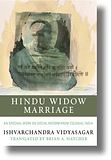Hindu Widow Marriage
Bidyāsāgara, Īśvaracandra (1820-1891):
Hindu Widow Marriage / Ishvarchandra Vidyasagar. A complete translation, with an introduction and critical notes, by Brian A. Hatcher. - New York : Columbia University Press, 2011. - ca. 272 S.
Einheitssachtitel: Vidhavāvivāha <engl.>
ISBN 978-0-231-15633-2
US$ 70,00 / £ 48,50
DDC: 306.84
-- Angekündigt für November 2011 --
Beschreibung
Before the passage of the Hindu Widow’s Re-marriage Act of 1856, Hindu tradition required a woman to live as a virtual outcast after her husband’s death. Widows were expected to shave their heads, discard their jewelry, live in seclusion, and undergo regular acts of penance. Ishvarchandra Vidyasagar was the first Indian intellectual to successfully argue against these strictures. A Sanskrit scholar and passionate social reformer, Vidyasagar was a leading proponent of widow marriage in colonial India, urging his contemporaries to reject a ban that caused countless women to suffer needlessly.
Vidyasagar’s brilliant strategy paired a rereading of Hindu scripture with an emotional plea on behalf of the widow, resulting in an organic reimagining of Hindu law and custom. Vidyasagar made his case through the two-part publication Hindu Widow Marriage, a tour de force of logic, erudition, and humanitarian rhetoric. In this new translation, Brian A. Hatcher makes available in English for the first time the entire text of one of the most important nineteenth-century treatises on Indian social reform.
An expert on Vidyasagar, Hinduism, and colonial Bengal, Hatcher enhances the original treatise with a substantial introduction describing Vidyasagar’s multifaceted career, as well as the history of colonial debates on widow marriage. He innovatively interprets the significance of Hindu Widow Marriage within modern Indian intellectual history by situating the text in relation to indigenous commentarial practices. Finally, Hatcher increases the accessibility of the text by providing an overview of basic Hindu categories for first-time readers, a glossary of technical vocabulary, and an extensive bibliography. [Verlagsinformation]
Inhalt
Preface. ix
A Word About the Translation. xiii
Hindu Categories for First-Time Readers. xvii
Chronology: Events Pertaining to the Widow Marriage Movement in Bengal. xxv
Introduction. 1
A Short Life of Ishvarchandra Vidyasagar. 3
Widow Marriage in Bengal. 10
Hindu Widow Marriage as Modern-Day Commentary. 30
The Real Significance of Hindu Widow Marriage. 41
HINDU WIDOW MARRIAGE: THE COMPLETE ENGLISH TRANSLATION
Book One. 57
Book Two. 71
Glossary. 217
Bibliography. 223
Index of Sanskrit Passages. 233
Index of Names and Terms. 237
Autor
ISHVARCHANDRA VIDYASAGAR (1820–1891) was a Sanskrit scholar, author, educator, and social reformer. A leading figure in the Bengal Renaissance, he was responsible for transformations in everything from Bengali prose style and printing techniques to Sanskrit curriculum and Hindu social practices.
Übersetzer
BRIAN A. HATCHER is professor and Packard Chair of Theology in the Department of Religion at Tufts University. His research centers on Hinduism in modern India. He is the author of Idioms of Improvement: Vidyasagar and Cultural Encounter in Bengal; Eclecticism and Modern Hindu Discourse; and Bourgeois Hinduism, or the Faith of the Modern Vedantists: Rare Discourses from Early Colonial Bengal. Profile page.
Quellen: Columbia University Press; WorldCat; Amazon; Library of Congress
Ähnlich
- Unfinished Gestures
- LaDousa: Hindi is Our Ground, English is Our Sky
- Titzmann: Der indische Online-Heiratsmarkt
- Veer: The Modern Spirit of Asia
- Kroll: Gesundheitliche Disparitäten im urbanen Indien
- The Jews of Andhra Pradesh
- Navigating Social Exclusion and Inclusion in Contemporary India and Beyond
- Chavan: Language Politics under Colonialism
- Warfare, Religion, and Society in Indian History
- Religion, Science, and Empire

